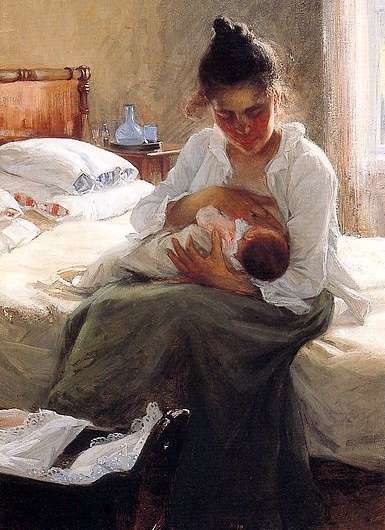Study shows a baby makes copies of maternal immune cells it acquires through mother's milk

Scientists have long understood that mother's milk provides immune protection against some infectious agents through the transfer of antibodies, a process referred to as "passive immunity." A research team at the University of California, Riverside now shows that mother's milk also contributes to the development of the baby's own immune system by a process the team calls "maternal educational immunity."
Specific maternal immune cells in the milk cross the wall of the baby's intestine to enter an immune organ called the thymus. Once there, they "educate" developing cells to attack the same infectious organisms to which the mother has been exposed.
The research, which used mouse foster nursing models, has important implications for vaccinating newborn babies. The researchers show that you can vaccinate the mother and this results in vaccination of the baby through this process.
"It's another way moms provide immune information to their babies," said Ameae Walker, a professor of biomedical sciences in the UC Riverside School of Medicine, who led the research. "It's as though the mother is saying, 'Look what I have seen in the environment that you need to be immune to as well.' The replicas – the copies of the maternal immune cells that the baby makes – will provide immunity to the baby for life."
Research results appear in the Sept. 15 issue of the Journal of Immunology
"Some vaccines are not safe to give a newborn baby and others just don't work very well in newborns," Walker said. "If we can instead vaccinate mom or boost her vaccination shortly before she becomes pregnant, transferred immune cells during breast feeding will ensure that the baby is protected early on. While our work has used mouse models because we can study the process in detail this way, we do know that milk cells cross into human babies as well."
One of the infectious agents the research team studied was the organism that causes tuberculosis (TB) – a disease that is a huge problem in many countries of the world and getting worse because of the development of antibiotic-resistant strains. Generally, babies directly vaccinated against TB do not have a very good response: while the vaccination prevents some of the worst complications, it does not prevent the respiratory part of the disease – what was once called consumption.
"We hope that by vaccinating the mother, who will eventually nurse the baby, we will improve infant immunity against TB," Walker said. "It's like vaccinating the baby without actually vaccinating the baby. In some instances, our work has shown that immunity against TB is far more effective if acquired through the milk than if acquired through direct vaccination of the baby. Of course, clinical trials will need to be conducted to test whether this is the case in humans."
How many cells get passed from mother to child depends a lot on how exposed the mother was to an infection. If she gets repeatedly exposed to an infection, her immune response would be boosted, and more cells would be passed on to the baby.
According to Walker, the passing of both antibodies and cells through the milk of wet nurses likely contributed to the survival of royal babies in times past.
"Wet nurses were usually from a lower social echelon," she explained, "and were likely exposed to more infectious agents. They had to have very robust immune systems to survive, and transfer of antibodies and cells through their milk probably contributed greatly to the survival of royal babies. What the research is telling us is that a baby would likely gain from nursing by multiple women with different immune backgrounds. Not too long ago in most cultures, if a baby cried a woman would pick it up and nurse it; most women were pregnant or lactating. Now, socially, we would think that rather peculiar – to nurse someone else's baby. But is the change in how society thinks about this issue the best for the baby's health ?"
More information: M. K. Ghosh et al. Maternal Milk T Cells Drive Development of Transgenerational Th1 Immunity in Offspring Thymus, The Journal of Immunology (2016). DOI: 10.4049/jimmunol.1502483
















